U-NAS NSC-810A NAS Case Review
In this review, we take a closer look at the U-NAS NSC-810A NAS Case, a compact storage enclosure designed to address the storage needs of various users. Our evaluation will provide a detailed examination of its design, features, and overall performance, offering a fact-based assessment to assist you in making an informed decision regarding its compatibility with your specific storage requirements. Whether you are a professional seeking reliable data storage solutions or an enthusiast embarking on a home NAS build, our analysis aims to provide a balanced and factual perspective on the U-NAS NSC-810A.
Note – You can watch the video review of the U-NAS NSC-810A NAS Enclosure HERE on YouTube
Hardware Highlights in Brief:
- Chassis Type: Mini-Tower.
- Color: Black.
- Motherboard Compatibility: Micro ATX, Mini-ITX.
- PSU Form Factor: 1U Flex (not included).
- Front Ports: 1 x USB 3.0, 2 x USB 2.0, Audio (mic & headphone).
- Cooling: 2 x 120mm Gelid Ultra Quiet Fans (variable speed).
- Expansion:
- Hot-Swap Drive Bays: 8 x 3.5” SATA/SAS.
- Internal Drive Bay: 1 x 2.5” HDD/SSD.
- Expansion Slots: 2 x PCI / PCI Express.
- Dimensions (L x W x H): 315mm x 275mm x 197mm (feet not included).
- Net Weight: 5.6KG.
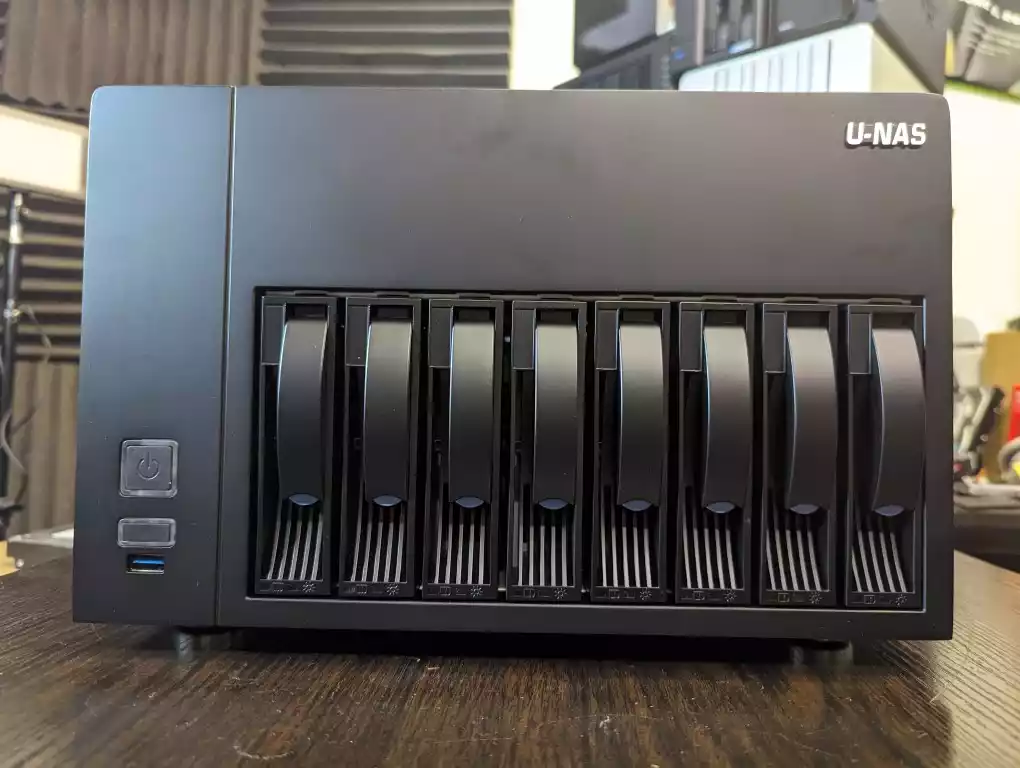
U-NAS NSC-810A NAS Case Review – Quick Conclusion
The U-NAS NSC-810A NAS Case provides a compact and well-organized storage solution with several advantages. It offers 8-Bay storage capacity and a user-friendly internal layout, including pre-connected SATA cables and effective cooling options. The option to replace the rear backplane and space for a 2.5” SATA SSD drive add to its versatility. However, some limitations include the non-standard PSU, potential constraints for M-ATX motherboards, and interference issues with larger PCIe cards. Despite these considerations, the NSC-810A remains a practical choice for specific storage needs, provided users account for its unique features and limitations.
| $219 (Check Amazon HERE) | $219 (Check Aliexpress HERE) |
| Pros of the U-NAS NSC-810A NAS Case | Cons of the U-NAS NSC-810A NAS Case |
|
|
U-NAS NSC-810A NAS Case Review – Packaging
The U-NAS NSC-810A NAS case arrives in a standard brown box, which can be described as rather generic in appearance. However, within this unassuming packaging, you’ll find a well-protected 8-Bay enclosure encased in sturdy black hard foam.
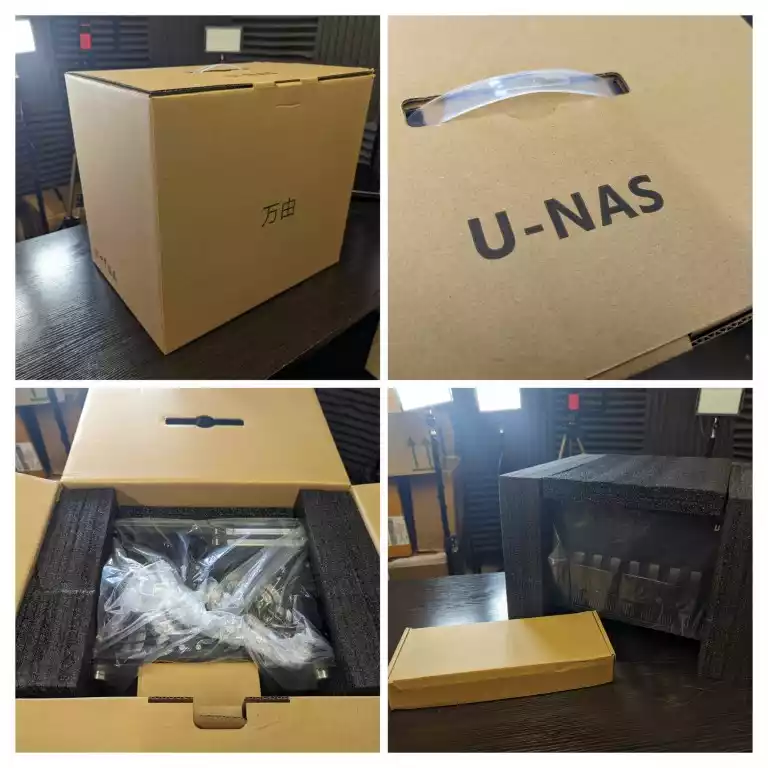
The accessories accompanying the enclosure come neatly organized within their dedicated kit box. This accessory box contains essential items such as cable ties, a molex power splitter, screws suitable for 2.5” and 3.5” HDDs, and a SATA 2.5” plate designed to accommodate a drive.
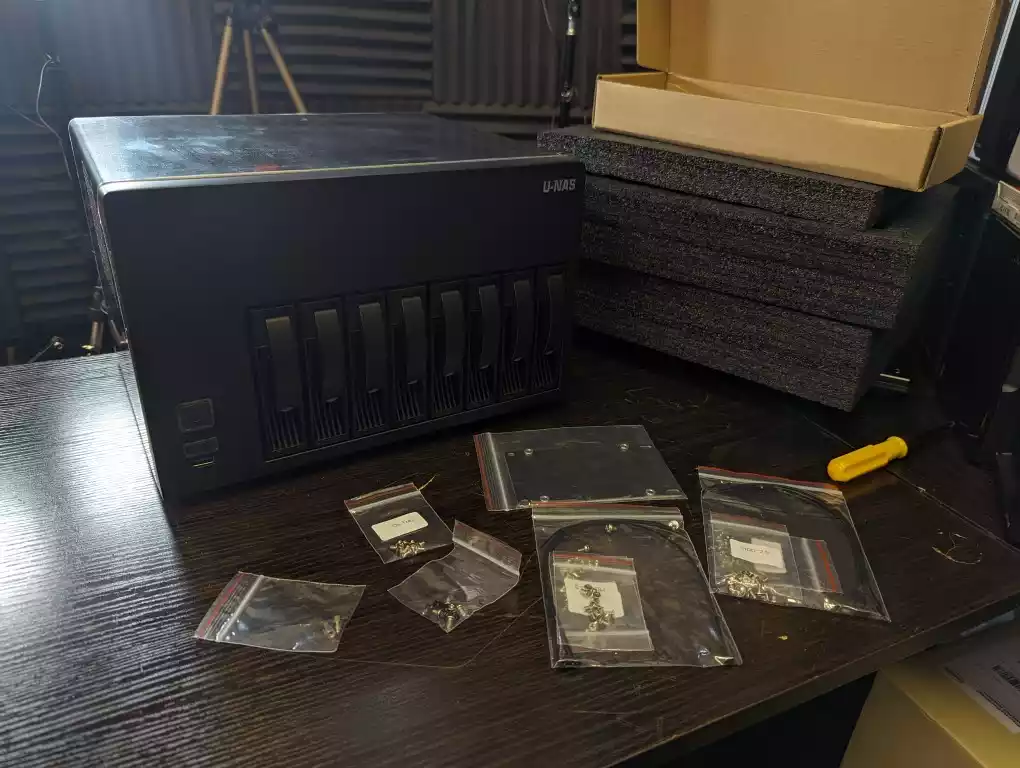
It’s worth noting that U-NAS offers additional accessories separately, allowing users to customize their NAS setup. These optional extras include SAS rear-connected backplanes and a PCIe EXTENSION KIT.
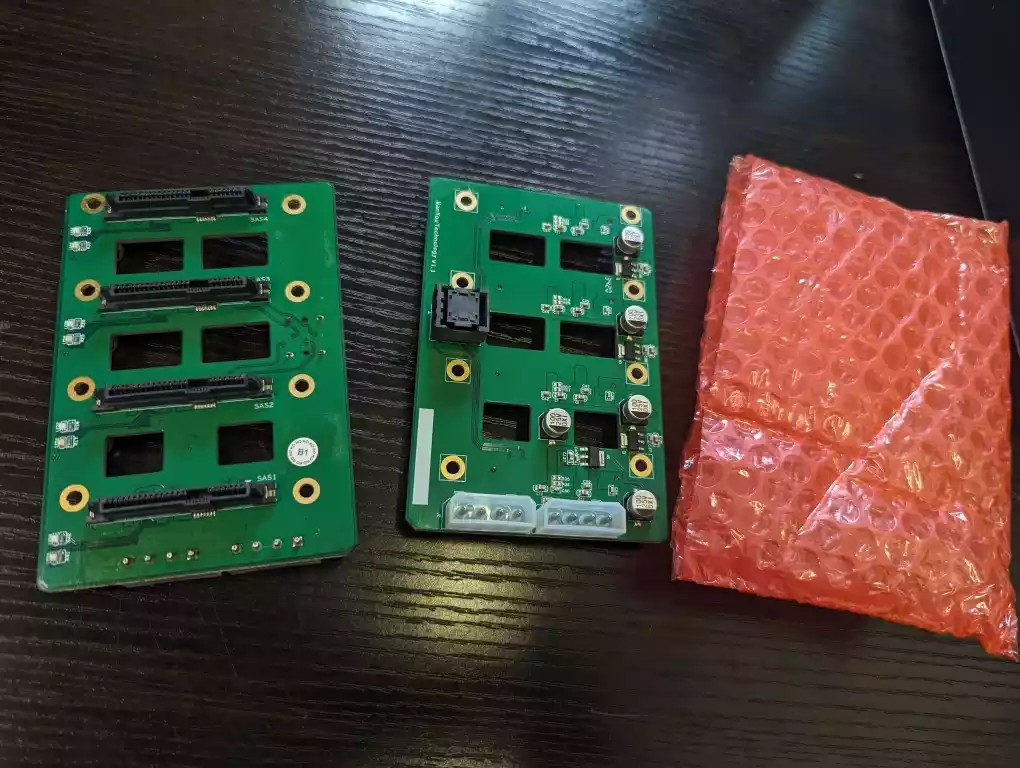
For those seeking a complete package, U-NAS provides the option to purchase the NAS case prepopulated with a 1U Flex 350W PSU included, priced at $329, or without any PSU included at a cost of $219. In the PSU-included configuration, the power supply unit arrives pre-installed, alongside the presence of 2x molex power connectors pre-connected to the storage backboard.
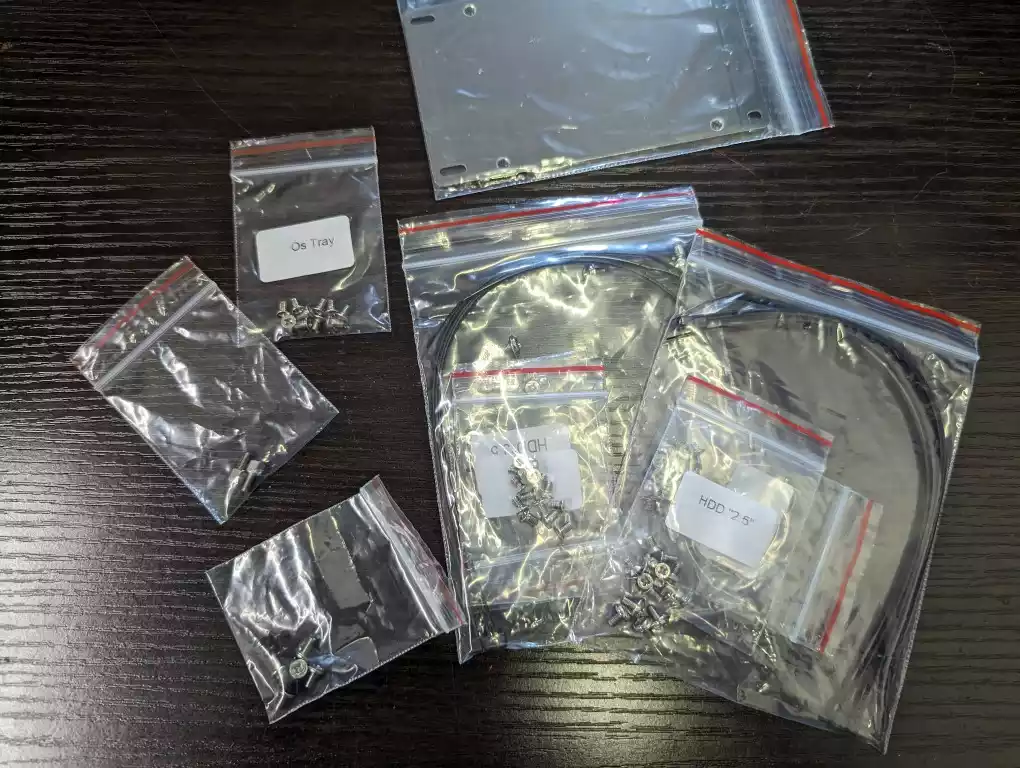
In summation, the accessories kit provided with the U-NAS NSC-810A NAS case offers practicality and organization. While the packaging and accessories might be characterized as somewhat generic, they nonetheless offer good value for the price, ensuring that users receive a comprehensive package equipped with essential components for their NAS setup.
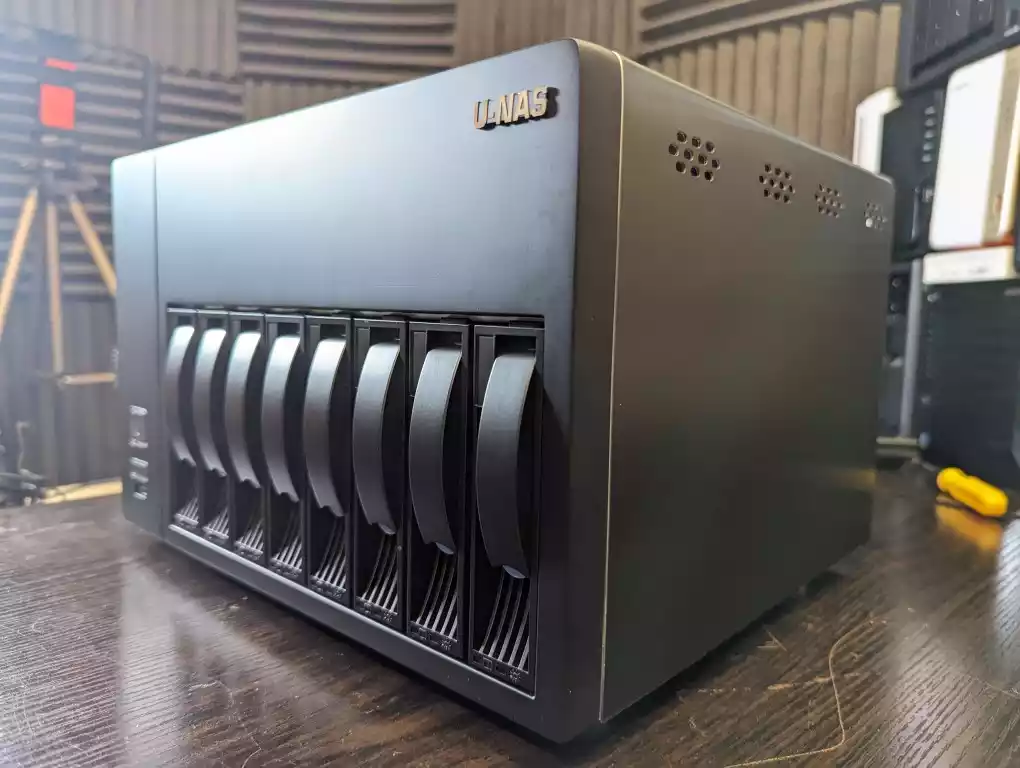
U-NAS NSC-810A NAS Case Review – Design
This NAS case, while not unique to the U-NAS brand, does arrive bearing the U-NAS logo prominently displayed at the top, distinguishing it from similar cases available on Aliexpress and Amazon.
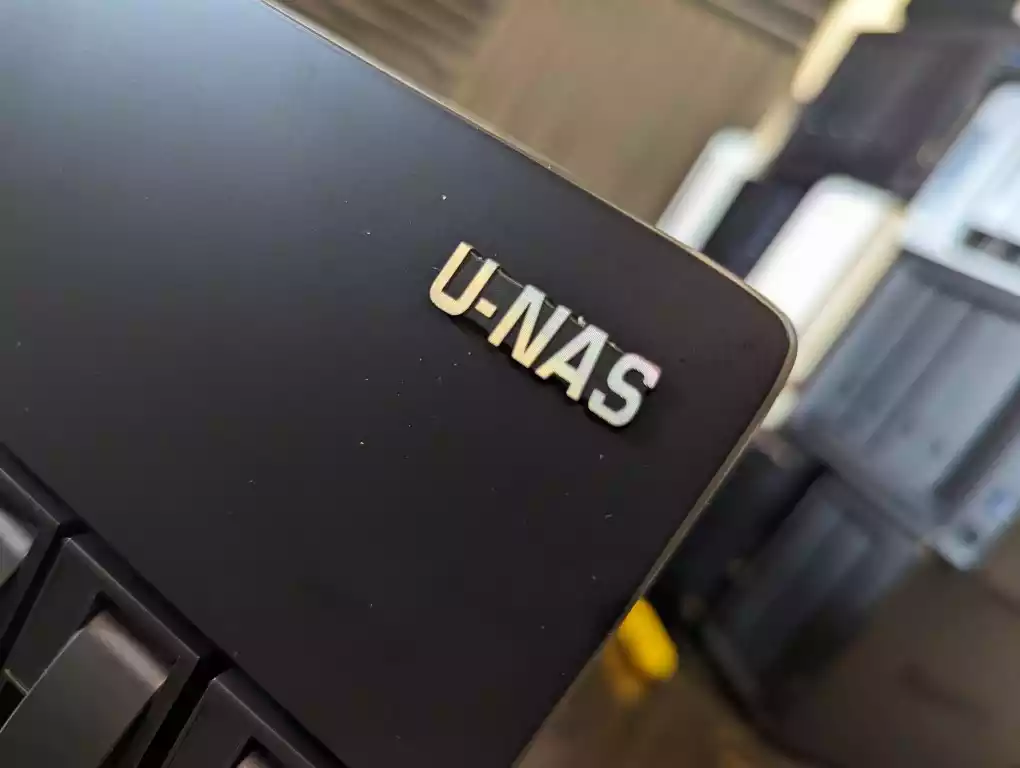
The chassis of the NSC-810A is characterized by its metal external lid, enveloping three sides of the enclosure. Its dimensions measure 315mm x 275mm x 197mm, presenting a desktop-style 8-Bay design.
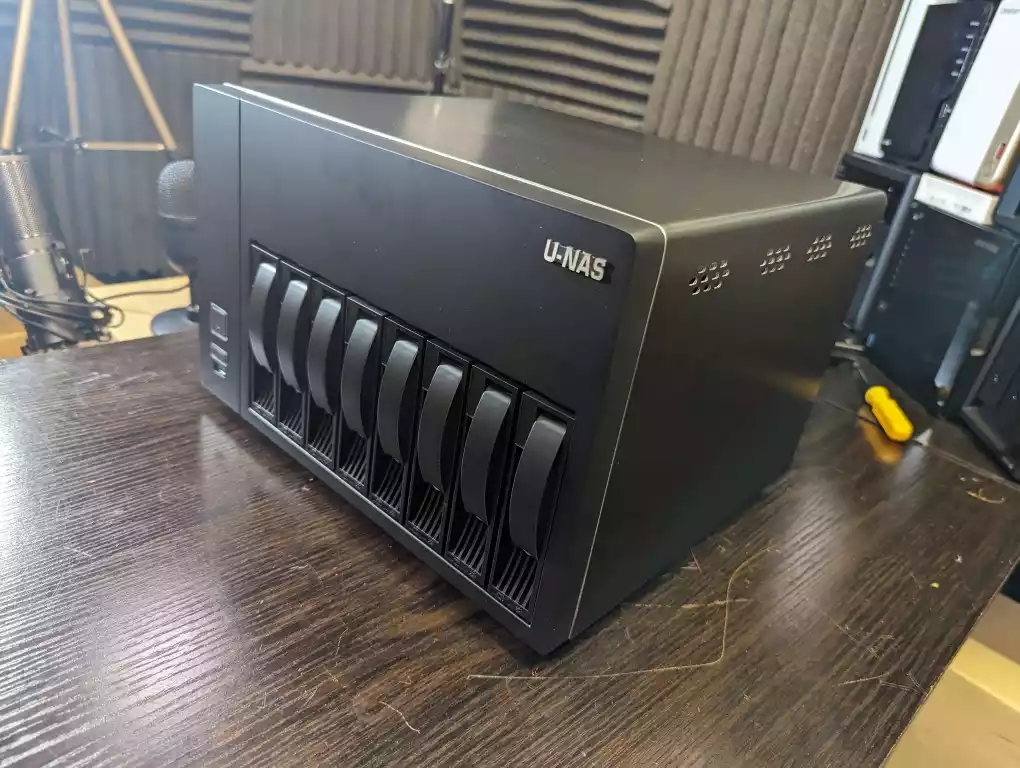
Upon unboxing, the case’s metal slides are found protected by a layer of plastic, which can be easily peeled off to reveal the pristine surfaces. While the metal casing may be considered somewhat thin, it provides a reassuring level of sturdiness.
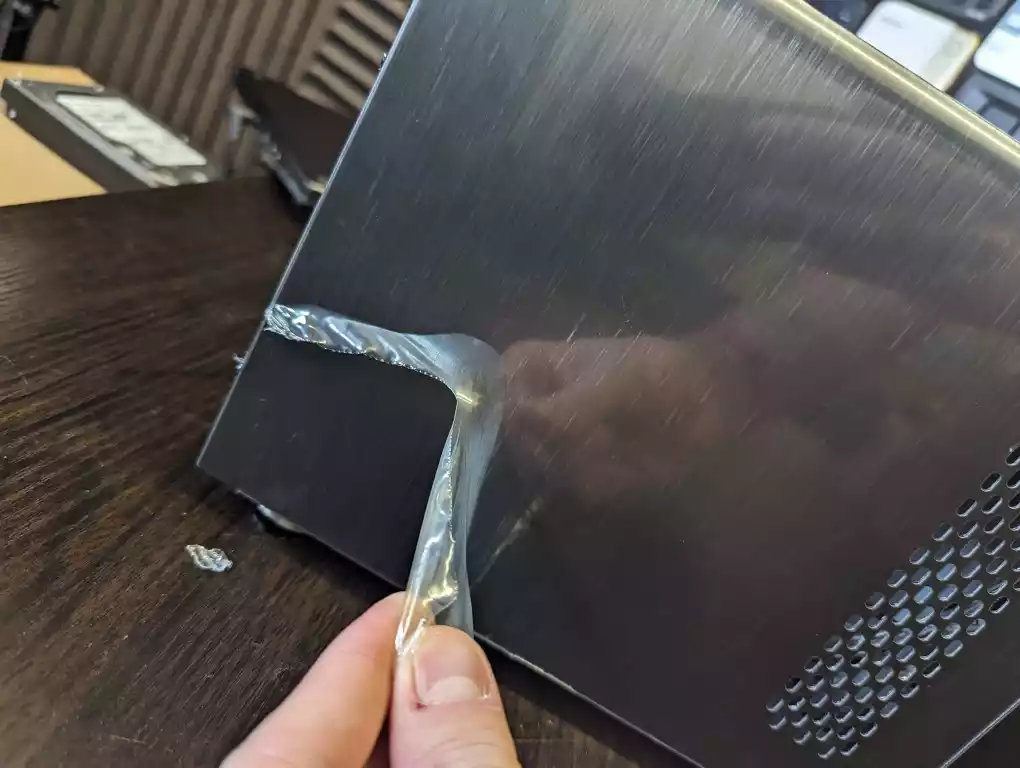
The external lid features a brushed and smooth metal finish, contributing to its overall aesthetics. Ventilation is concentrated on one side of the case, where the motherboard and CPU are typically located. Here, an internally mounted 80mm Geild silent fan ensures airflow.
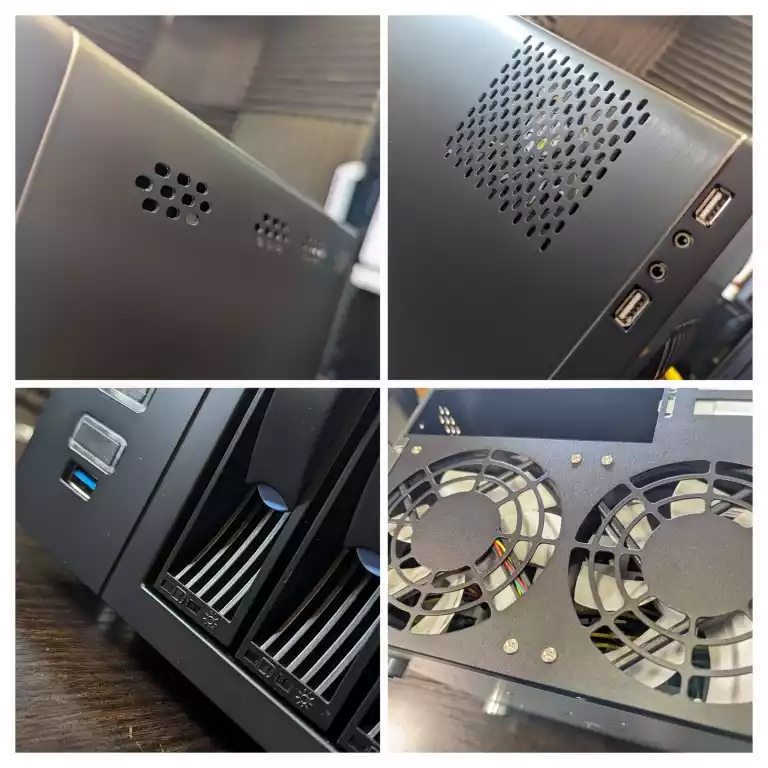
On the opposite side of the case, three smaller ventilation panels are present, contributing to cooling efforts. However, it’s important to note that there is no further ventilation on the top or base of the chassis.
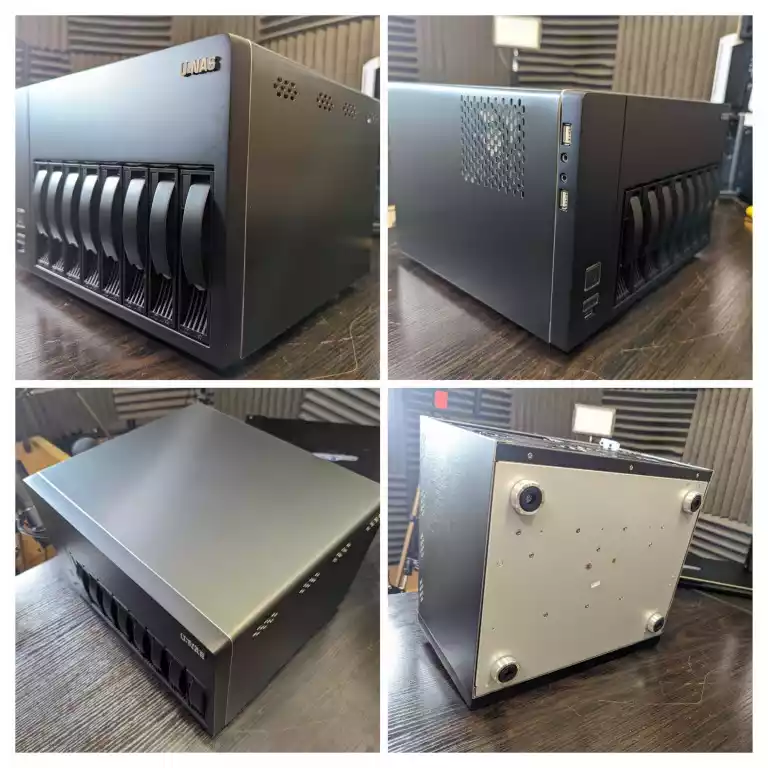
The front panel of the case is constructed from plastic and lacks a dedicated cavity for an LCD panel. While not a glaring issue, it results in a noticeable and somewhat unconventional space on the front panel. It includes a clearly visible USB Type-A USB 3.2 Gen 1 (5Gb/s) port, as well as sturdy power on/off and reset buttons.
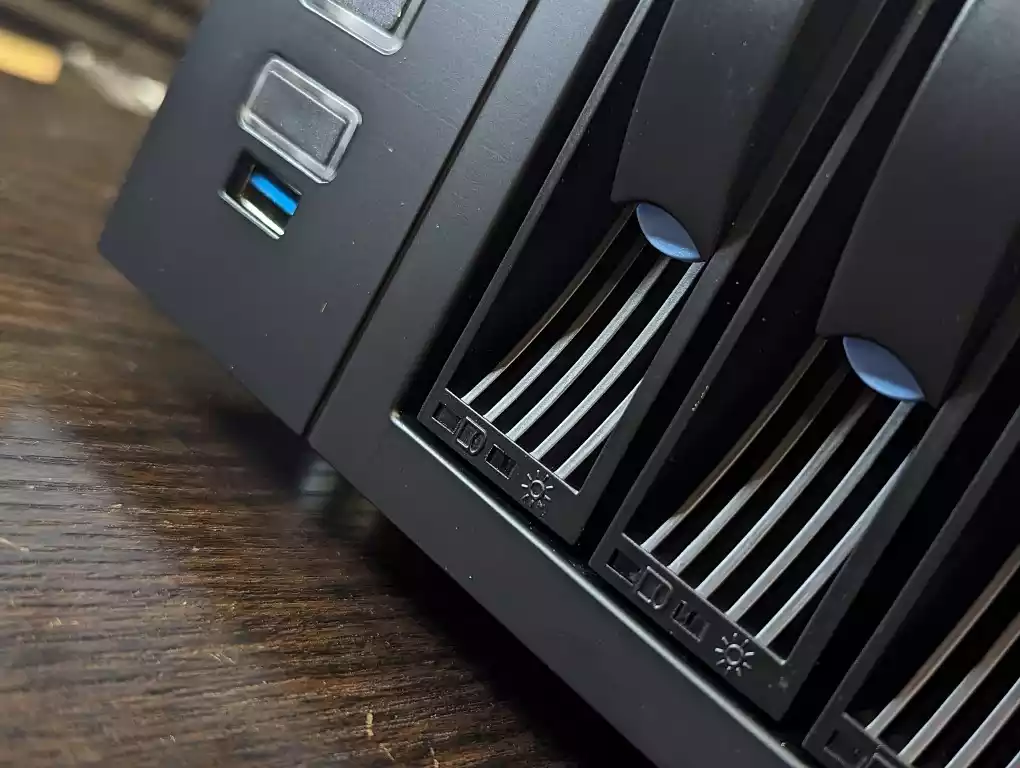
One distinctive feature is found at the corner edge of the front panel, where 2x additional USB 2.0 Type-A ports and sound (audio In/Out) ports are located. This addition enhances the case’s functionality and connectivity options.
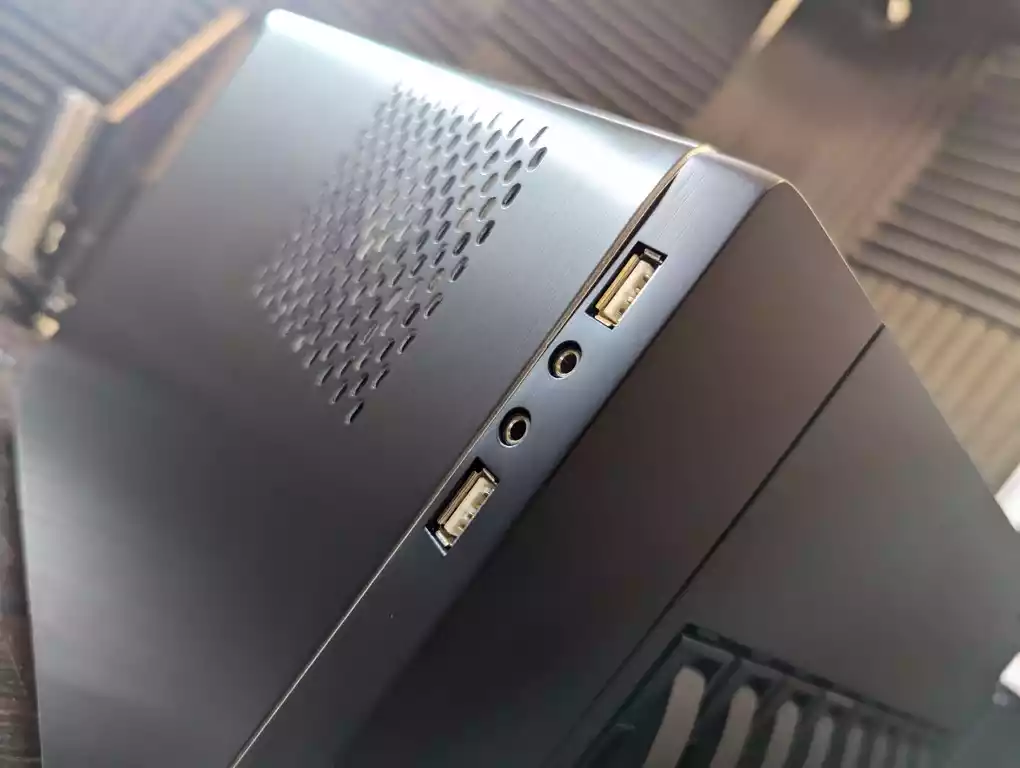
While the individual storage bays within the case are not lockable, they feature ample ventilation to support cooling. Each storage tray is designed for easy removal and includes a spring-loaded handle for user convenience. Inside each bay, combined SAS/SATA connectors facilitate connectivity.
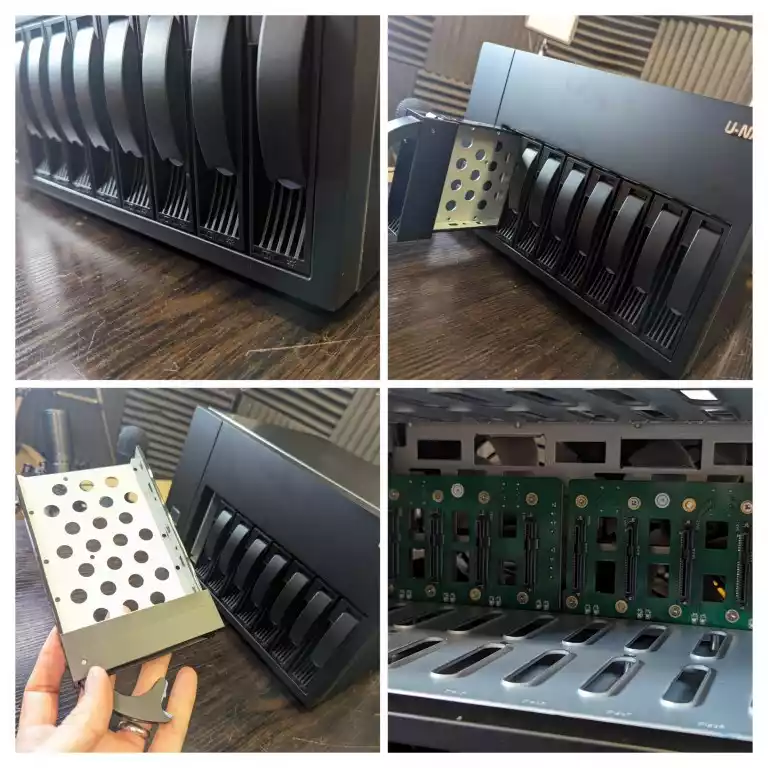
Turning to the rear panel, it features two large 120mm fans to manage cooling efficiently. The case includes a clear M-ITX, DTX, or M-ATX-ready backplane panel, with the board placed horizontally at the top left of the casing. However, this orientation results in an issue with PCIe card deployment, which will be elaborated on later in the review.
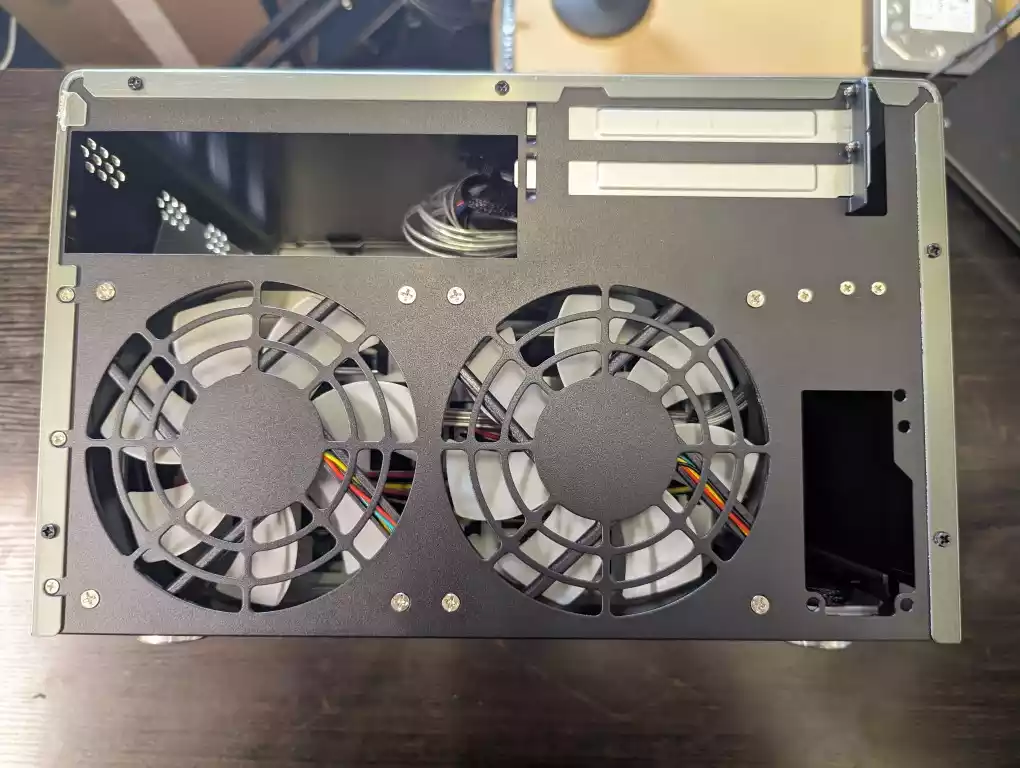
In terms of aesthetics, it’s important to acknowledge that the case may appear somewhat dated by the standards of 2023/2024. Nonetheless, it compensates for this with its robust construction, signifying durability as a primary attribute.
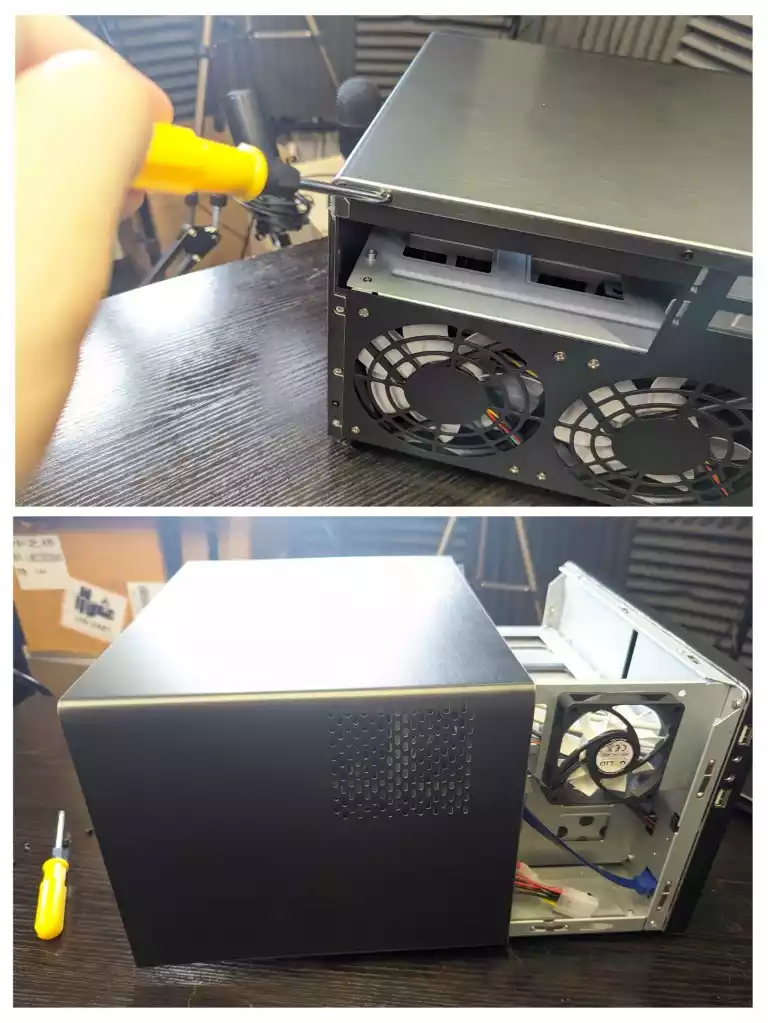
U-NAS NSC-810A NAS Case Review – Inside
Inside the U-NAS NSC-810A, you’ll find an internal 1U FLEX PSU cavity. However, it’s worth noting that some users may prefer a standard SFX PSU due to its wider availability in retail shops.
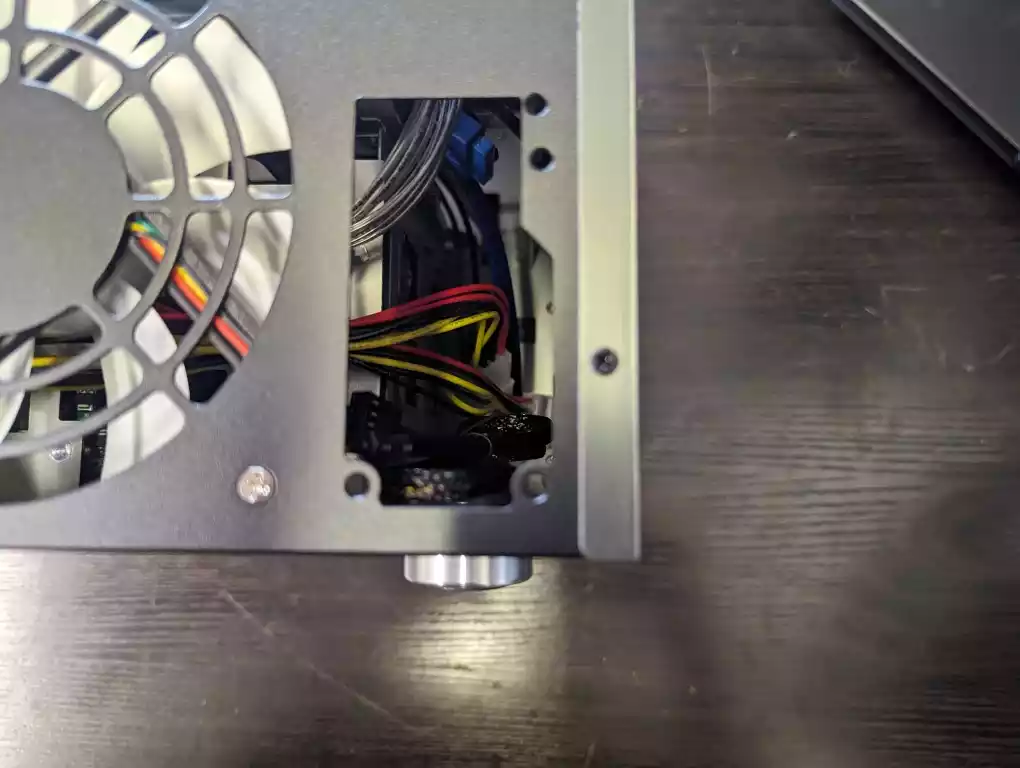
The included PSU comes with a main 20 PIN connector, 2x SATA power connectors, and 2 additional smaller motherboard port connectors, ensuring adequate power distribution.
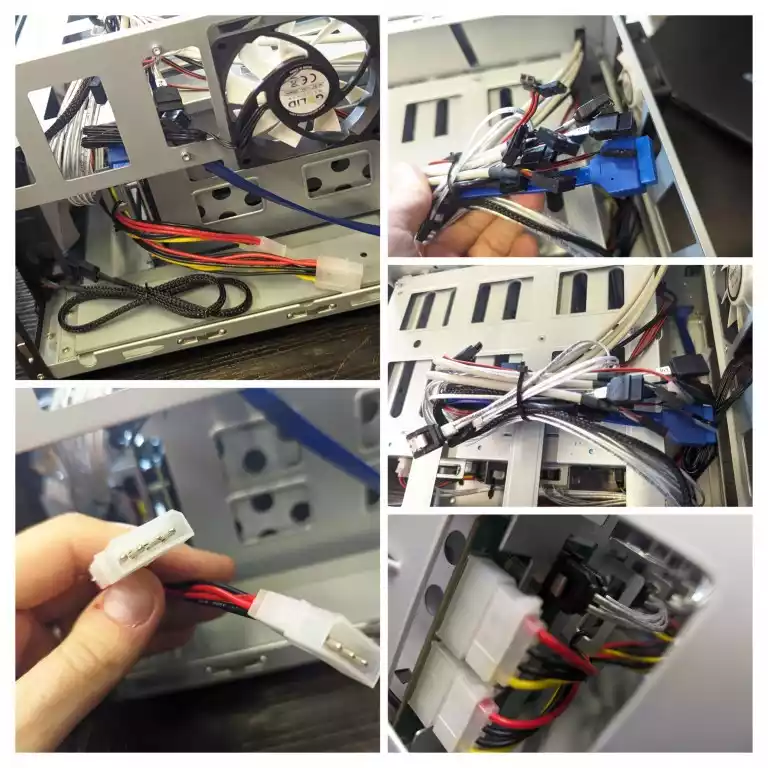
The case comes equipped with pre-connected SATA data cables, offering convenience during setup. These SATA cables are pre-attached to the rear backboard, streamlining cable management. Power for the SATA backboard is also pre-attached via 2x molex power cables, contributing to a tidy and organized internal layout.
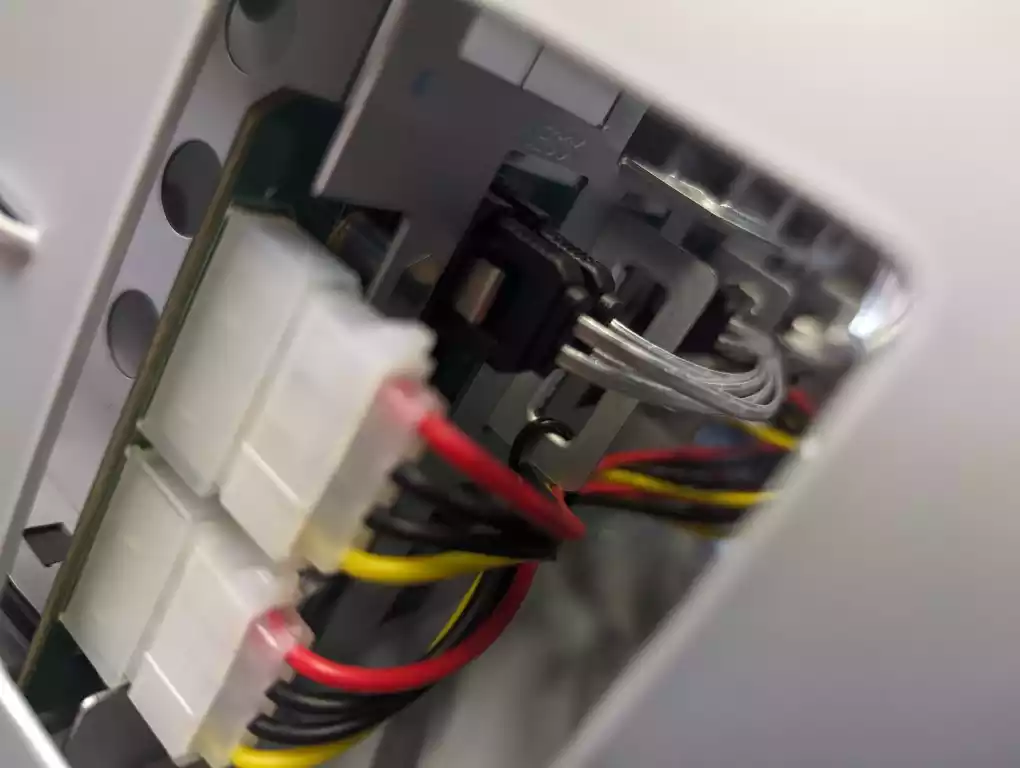
Front panel cables are neatly arranged, maintaining an organized appearance. The front panel connectors encompass a USB 3.2 Gen 1 port, power and reset buttons, LED indicators, audio In/Out ports, and 2x USB connectors, enhancing the case’s connectivity options.
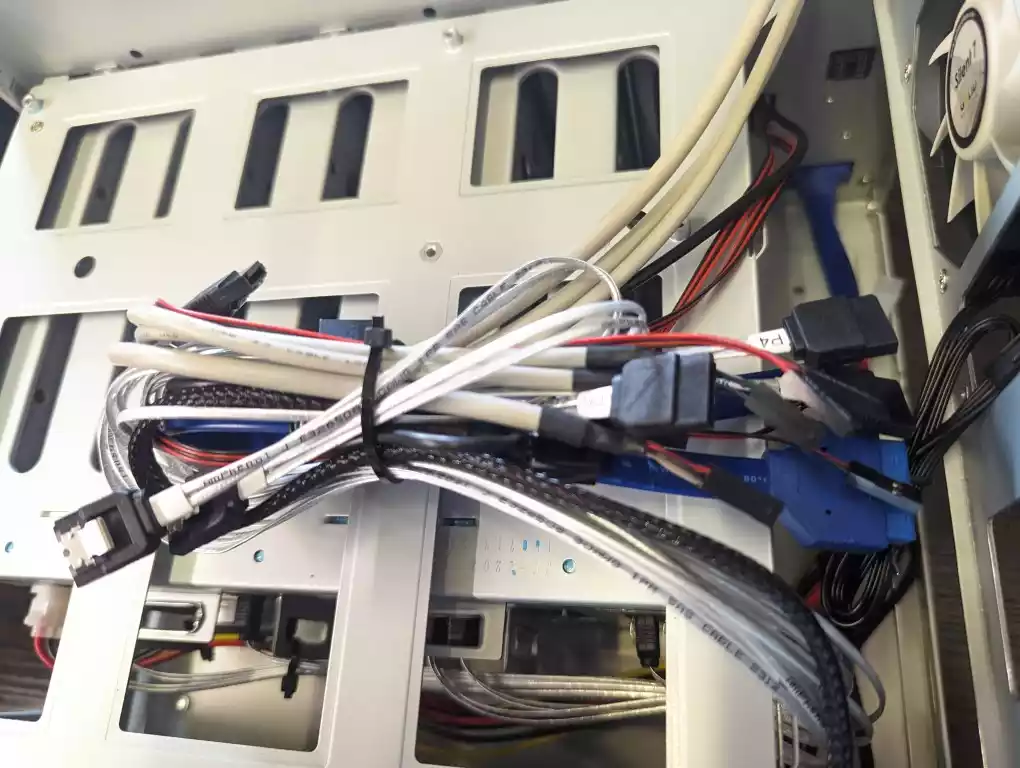
The M-ITX or M-ATX motherboard is mounted horizontally at the top of the case, which accommodates 2x PCIe slots with full width and ¾ length cavities. However, due to the motherboard’s horizontal placement, the installation of PCIe cards necessitates the use of a PCIe riser or extender, which further occupies the limited internal space, mainly already occupied by cables.
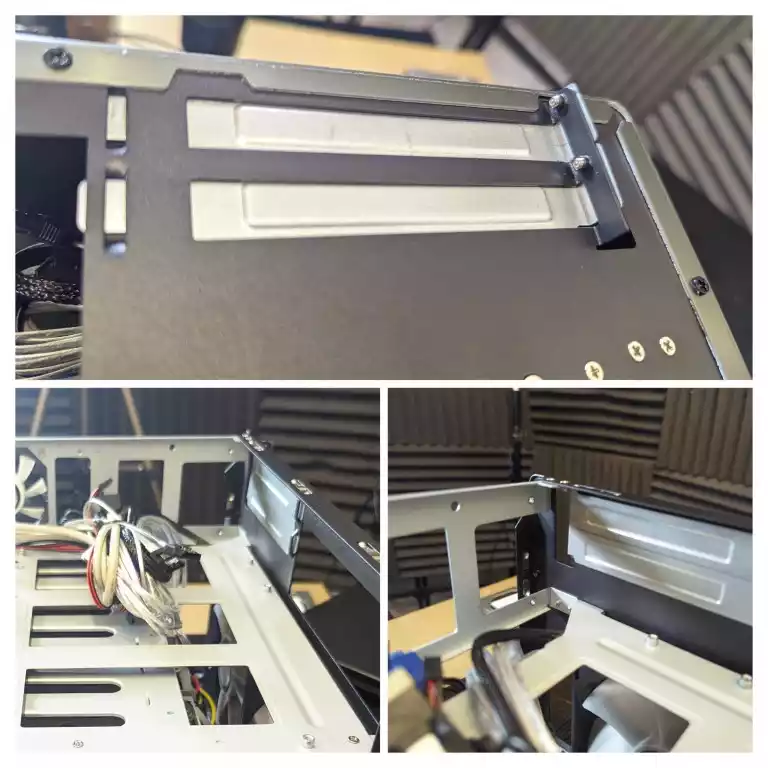
M-ATX motherboards, in particular, may fit quite snugly, especially with the presence of cables and a riser, potentially impacting airflow and components’ accessibility.
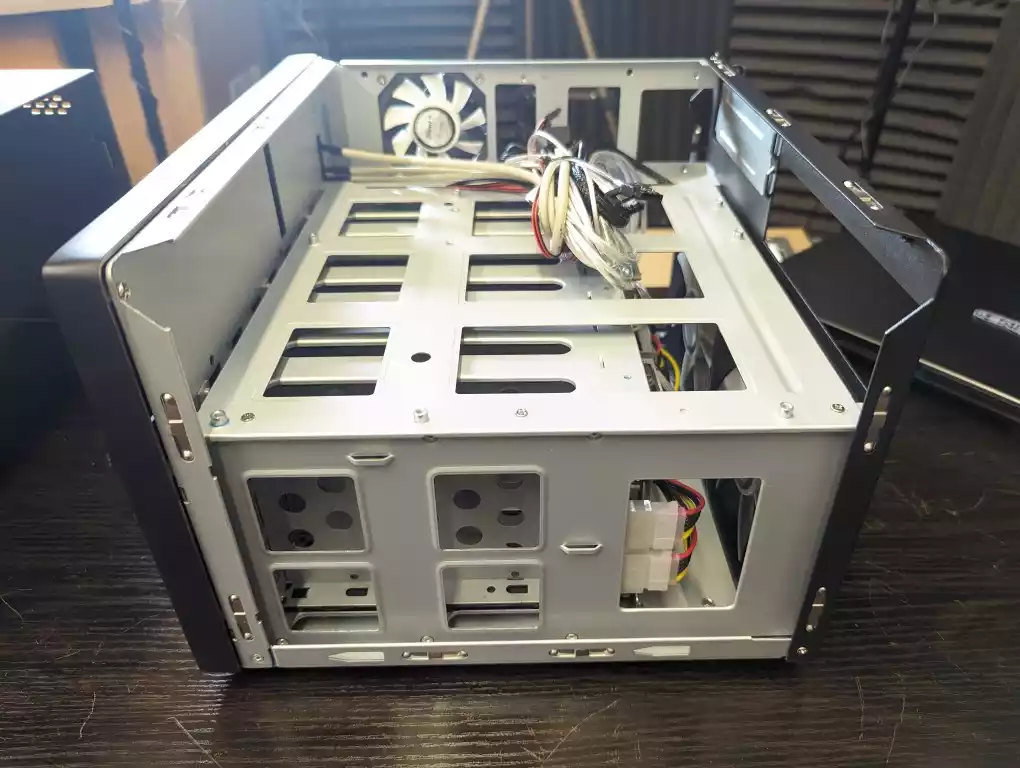
The CPU fan height allowance within the case is relatively generous, especially when compared to the NSC-410 4-Bay model. Additionally, the presence of an internal fan ensures active airflow over the motherboard and CPU cooler.
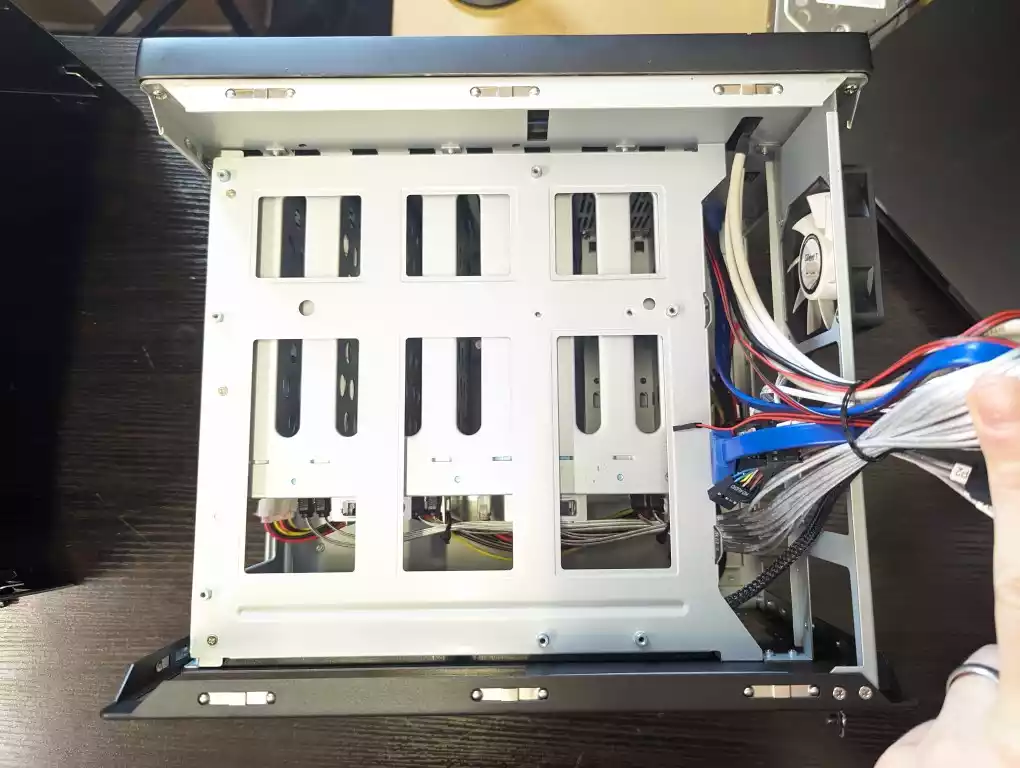
However, the internal 80mm fan is positioned in the pathway of the PCIe cards. Consequently, exceptionally large PCIe cards may obstruct this fan. An alternate placement on the other side of the casing might have mitigated this issue.
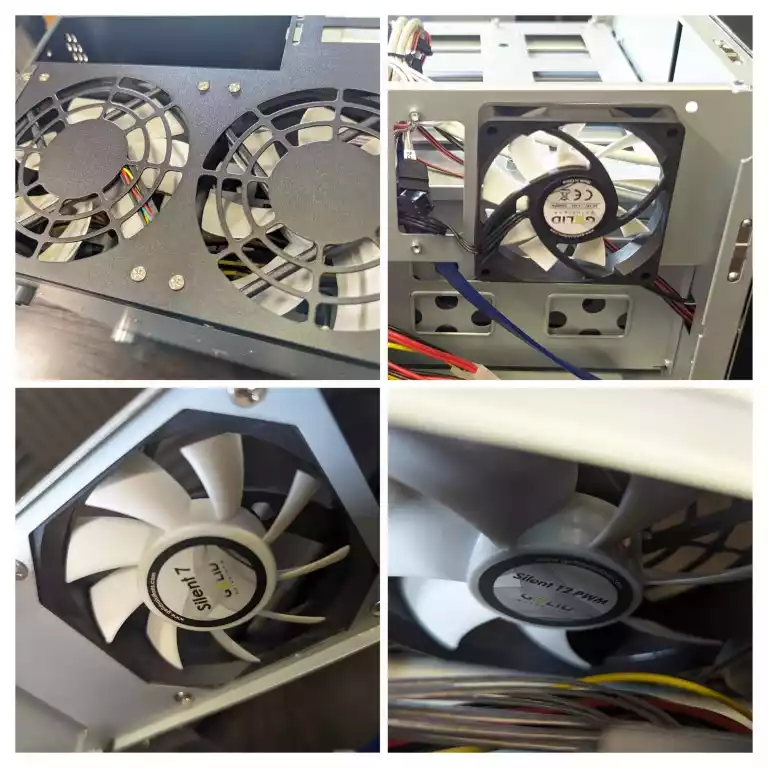
It’s important to note that more powerful CPUs, such as Intel Core i5 and above or high-end AMD Ryzens, may encounter thermal challenges in this configuration. To address potential overheating concerns, users may need to invest in integrated and compact copper-piped CPU heatsinks and fans.
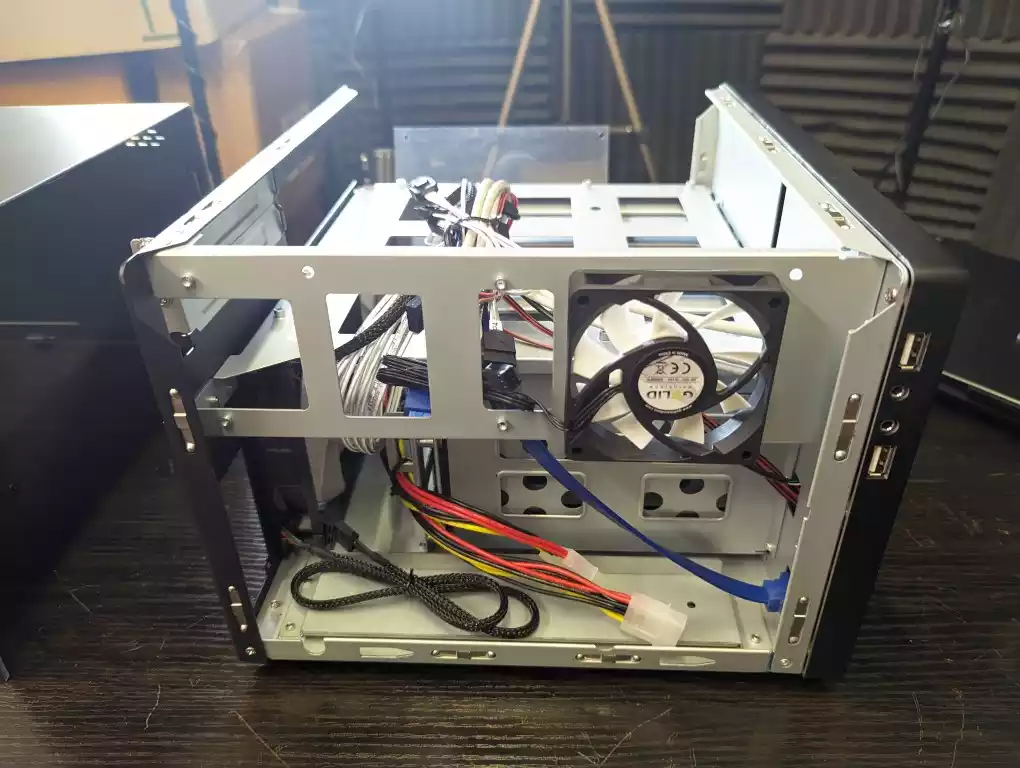
The rear backplane responsible for SATA/SAS connections can be replaced with a SAS backplane version, an option available from U-NAS. Furthermore, the case offers space for a 2.5” SATA SSD drive, and an additional SATA cable is included to facilitate this.
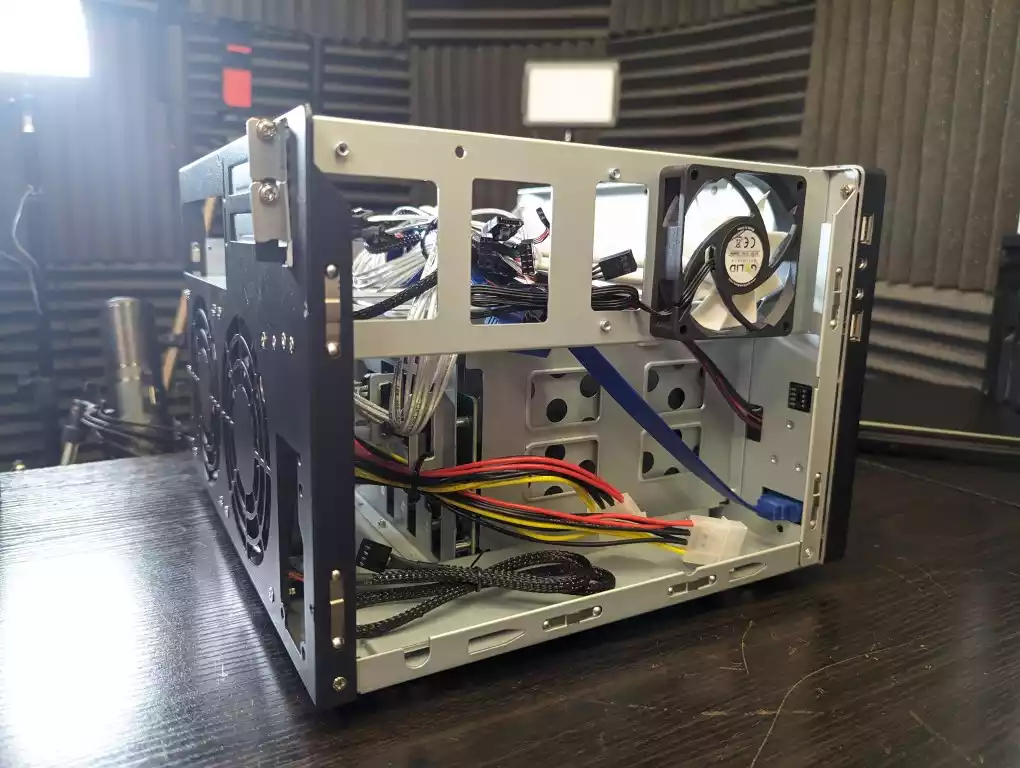
The U-NAS NSC-810A represents a compact case with certain design considerations. While it allows for an organized interior layout, the placement of the motherboard in close proximity to the 8-Bay SATA drive cage at an angle may limit CPU fan options and potentially obstruct horizontal airflow. Other cases, such as the Audhied K7, have addressed motherboard placement differently, providing more space for CPU fans and eliminating the need for PCIe risers/extenders.
U-NAS NSC-810A vs NSC-410 NAS Case Comparison
The U-NAS NSC-410 and NSC-810A NAS cases, both offering storage solutions, exhibit distinct differences while sharing some common traits. In terms of size, the NSC-410 is a smaller 4-Bay enclosure, whereas the NSC-810A boasts a more extensive 8-Bay capacity. This difference in capacity makes the NSC-810A a preferable choice for users with larger storage needs, while the NSC-410 caters to more modest requirements. While both cases maintain an organized internal layout with pre-connected SATA cables and tidy front panel connectors, they differ in the placement of motherboards. The NSC-410 positions motherboards vertically, while the NSC-810A opts for a horizontal placement. This design choice impacts CPU fan options and airflow considerations, with the NSC-810A potentially limiting the space available for CPU cooling solutions. Additionally, the NSC-810A features two large 120mm fans on its rear panel, enhancing cooling capabilities, whereas the NSC-410 relies on a single 120mm fan for airflow.
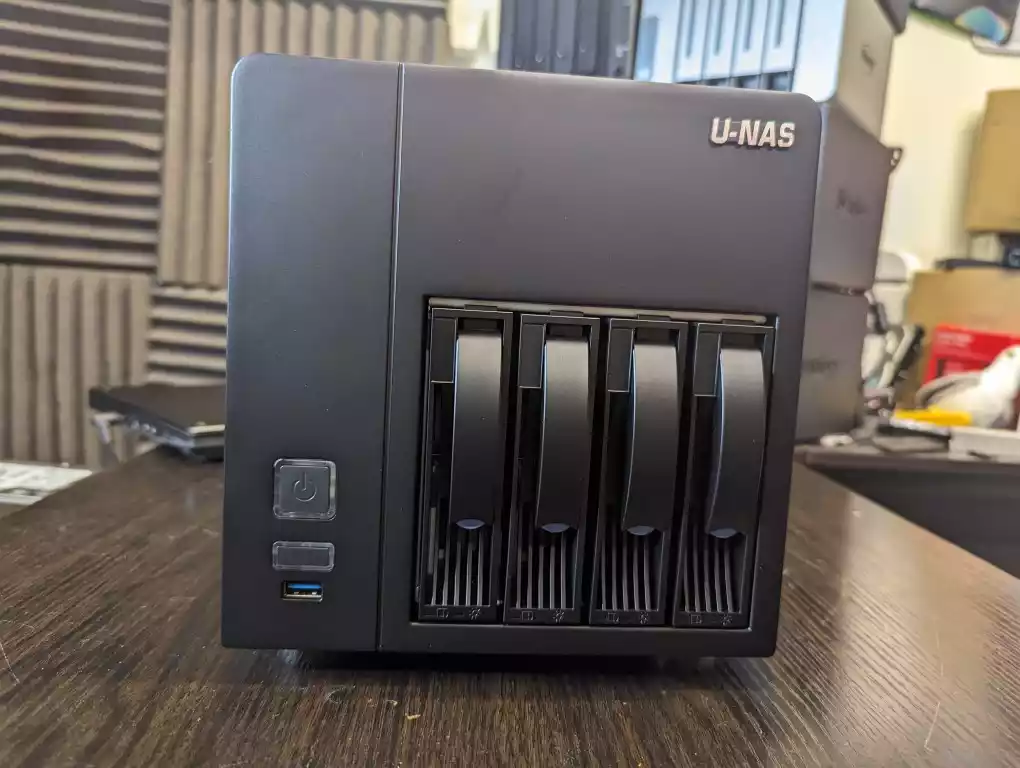 |
 |
Key Differences:
- Compatibility: The NSC-810A supports both M-ITX and M-ATX Motherboards, whereas the NSC-410 only supports M-ITX
- Capacity: NSC-410 offers 4-Bay storage, whereas NSC-810A provides an 8-Bay capacity.
- Motherboard Placement: NSC-410 positions motherboards vertically, while NSC-810A mounts them horizontally.
- Cooling: NSC-810A incorporates two large 120mm fans for enhanced cooling, while NSC-410 relies on a single 120mm fan.
- Size: NSC-810A is larger with dimensions of 315mm x 275mm x 197mm, while NSC-410 is more compact at 263mm x 195mm x 197mm.
- Storage Bay Trays: The NSC-810A may accommodate larger PCIe cards due to its additional size, while the NSC-410 may have constraints in this regard.
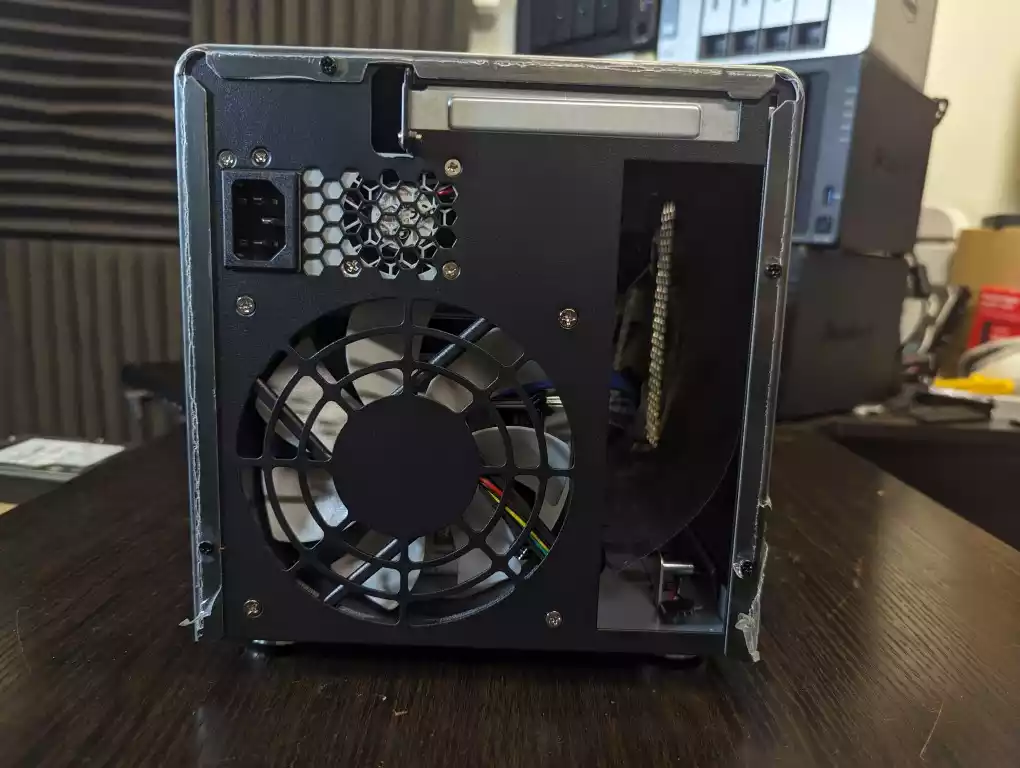 |
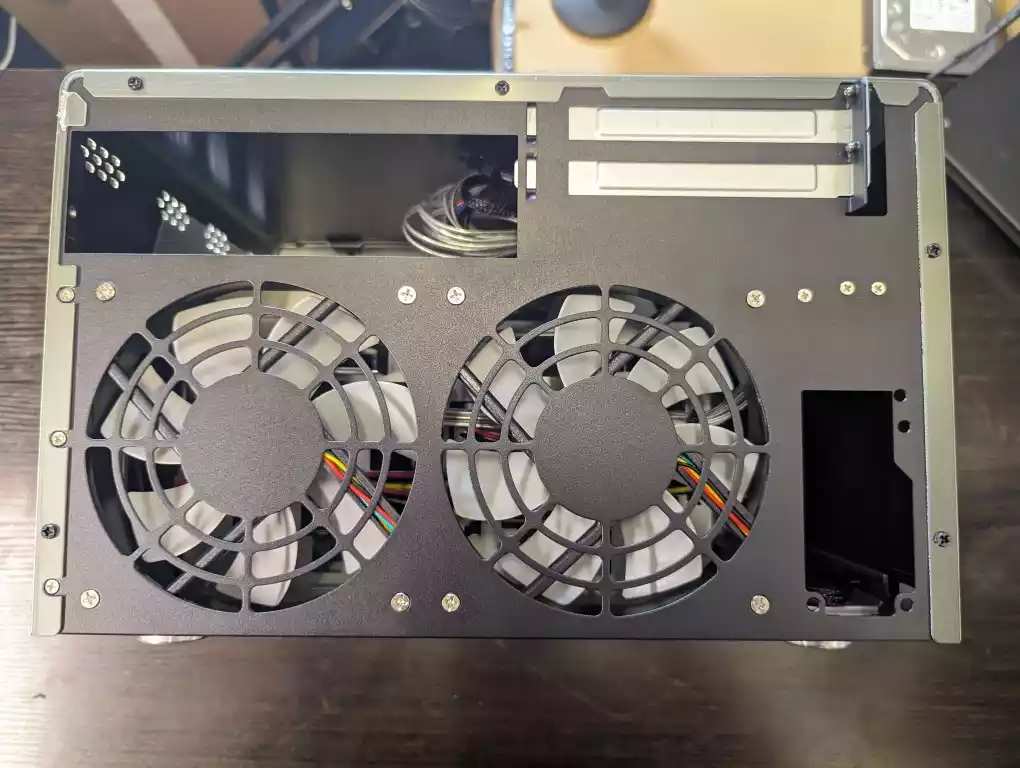 |
U-NAS NSC-810A NAS Case Review – Verdict and Conclusion
The U-NAS NSC-810A NAS Case presents a practical solution for those seeking a compact and well-organized storage enclosure. While it offers several notable advantages, there are certain considerations to bear in mind. On the positive side, the case’s compact design with 8-Bay storage capacity makes it suitable for various storage needs. The organized internal layout, including pre-connected SATA cables and tidy front panel connectors, streamlines the installation process. Additionally, the generous CPU fan height allowance and the presence of an internal fan contribute to effective cooling solutions. The option to replace the rear backplane with a SAS version enhances the case’s versatility, and the provision of space for a 2.5” SATA SSD drive is a practical inclusion. The case’s overall construction, with a durable metal exterior, underscores its longevity. However, it’s important to acknowledge certain limitations, such as the non-standard 1U FLEX PSU, which may require some users to adapt their power supply configuration. The motherboard’s close proximity to the SATA drive cage may restrict CPU fan choices and impact airflow, necessitating PCIe risers or extenders.

Furthermore, the case’s suitability for M-ATX motherboards, particularly with additional cables and risers, may be constrained. The internal 80mm fan’s position can interfere with larger PCIe cards, requiring careful consideration during component selection. Finally, users with more demanding CPUs may need to invest in specialized cooling solutions. The NSC-810A NAS Case offers a practical and compact storage solution, complemented by an organized interior and robust construction. While it has certain design considerations, its overall positive attributes make it a viable choice for those with specific storage requirements, provided they align with the case’s unique features and limitations.
 |
|
| $219 (Check Amazon HERE) | $219 (Check Aliexpress HERE) |
| Pros of the U-NAS NSC-810A NAS Case | Cons of the U-NAS NSC-810A NAS Case |
|
|
🔒 Join Inner Circle
Get an alert every time something gets added to this specific article!
This description contains links to Amazon. These links will take you to some of the products mentioned in today's content. As an Amazon Associate, I earn from qualifying purchases. Visit the NASCompares Deal Finder to find the best place to buy this device in your region, based on Service, Support and Reputation - Just Search for your NAS Drive in the Box Below
Need Advice on Data Storage from an Expert?
Finally, for free advice about your setup, just leave a message in the comments below here at NASCompares.com and we will get back to you. Need Help?
Where possible (and where appropriate) please provide as much information about your requirements, as then I can arrange the best answer and solution to your needs. Do not worry about your e-mail address being required, it will NOT be used in a mailing list and will NOT be used in any way other than to respond to your enquiry.
Need Help?
Where possible (and where appropriate) please provide as much information about your requirements, as then I can arrange the best answer and solution to your needs. Do not worry about your e-mail address being required, it will NOT be used in a mailing list and will NOT be used in any way other than to respond to your enquiry.

|
 |
Minisforum G7 Pro Review
CAN YOU TRUST UNIFI REVIEWS? Let's Discuss Reviewing UniFi...
WHERE IS SYNOLOGY DSM 8? and DO YOU CARE? (RAID Room)
UniFi Routers vs OpenWRT DIY Routers - Which Should You Choose?
WHY IS PLEX A BIT S#!t NOW? IS 2026 JELLYFIN TIME? (RAID Room)
Synology FS200T NAS is STILL COMING... But... WHY?
Access content via Patreon or KO-FI





Discover more from NAS Compares
Subscribe to get the latest posts sent to your email.


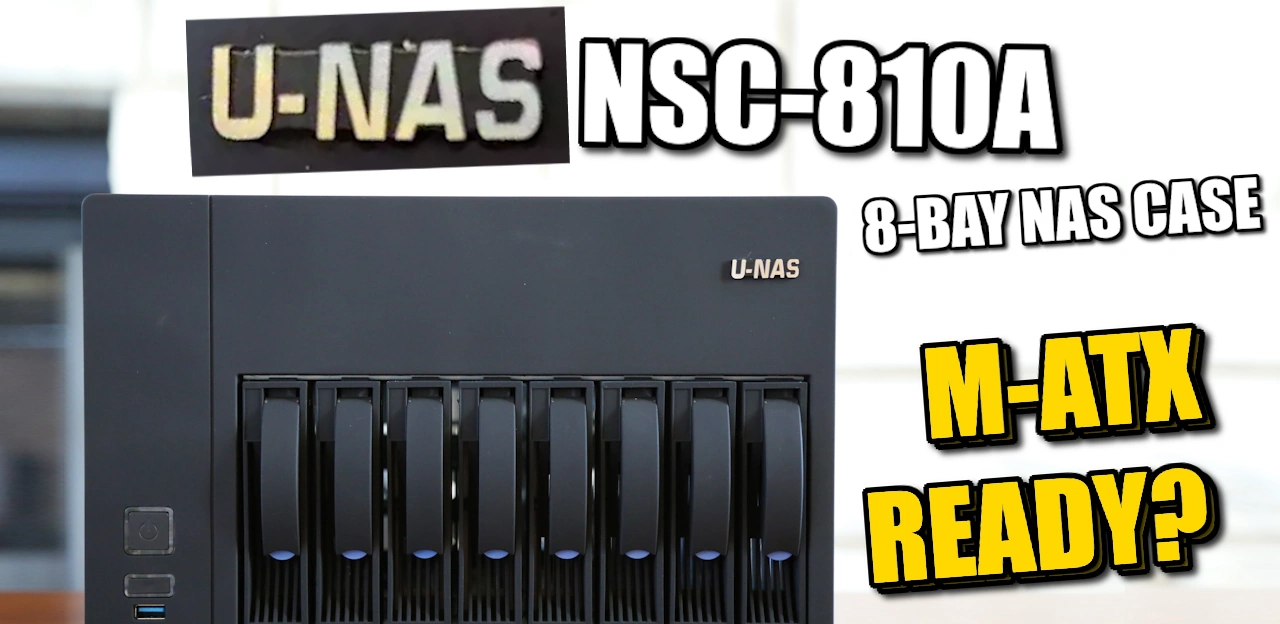




Why do you say sas has no benefit of throughput over sata here?
REPLY ON YOUTUBE
I would really like it if you could find a NAS case that is not manufactured by an evil Communist Dictatorship the is hell bent on conquering the world! Everything we purchase from communist China contributes directly to their ability to fund their dramatic increase in the size of their military which they will eventually use to invade Democratic countries based on the rhetoric that they have been pumping out over the last 6 years. Hell I would buy a product made in Communist Vietnam before I would buy a product made in Communist China any day. We owe the Vietnamese for bombing the crap our of their country for two decades and they are not building a military to conquer the globe at the moment.
REPLY ON YOUTUBE
Good video, thank you. Another option is the Sagitarius 8bay nas, its an matx case which supports 8×3.5inch HDD + 2×2.5inch hdd/ssd. It also supports full atx PSU and is not much bigger than the Jonsbo N4. I recently ordered one from Aliexpress so will be migrating my home server to it.
REPLY ON YOUTUBE
I am looking for a case for my HP prodesk. I don’t want to have to buy another motherboard or PSU. (I have a Spare ATX PSU).
I want it to support MATX, with ATX PSU and 4 drives + would be ideal… any suggestions?
REPLY ON YOUTUBE
It picks up fingerprints easily?
That’s a deal-killer. I’m *constantly* stroking and caressing my NAS and I care greatly for both its physical appearance and the amount of hand oil on it.
Do a shot every time he calls a motherboard a “card”, for some reason.
“I can’t test the fans.” You don’t have a simple 12v power supply?
17:00 “Though it does support those ATX boards…” no, it doesn’t.
17:08 “Those mITX boards”
Bruh, MATX != ATX != Micro ITX.
You missed the mounting point for a 2.5″ SSD.
They want you to buy the “16X PCIe Extension Kit for NSC-800 and 810A Server Chassis” for the PCIE slots.
REPLY ON YOUTUBE
I Thought I would share my experience with cases and MB. I went with a SuperMicro A2SDi-16C-HLN4F 16 core Atom C3955 motherboard with M.2 for OS and two mini-SAS to Sata for HHD. I have used it for Server 2016 and Unraid with no performance issues. Be sure to get a fan for the CPU. I have also used the Asrock C2750D4I ITX board. Performance wise it is fine but if you don’t update the BIOS and BCM before using it. It continuously sends out a beacon and like a lightbulb never turned off dies randomly. There are people on eBay that sell the BCM chip so it’s not a huge deal to me. Note I built these long ago, so I am sure there are better MB available although I am still fond of my SuperMicro MB. 16 core and never had a performance issue.
I have the U-NAS case. My comment is buy a box of Band Aids before working on it. Getting the case cover on it is difficult as well. It requires you to latch the front part on and no matter how careful you are one latch will get missed and not be mounted flush to the case. The metal is thin and I think they made me buy a SSD mount as an “add on” accessory. For myself, I would not buy another one. I think at the time they offered the PSU so I bought it to save time and it was IMO junk. Ironically supply for these cases are limited. I have seen that UNAS has some new brand name on it to. I am not sure about that situation. IMO a bad product by any name is still a bad product.
Case 1) Supermicro SuperChassis CSE-721TQ-350B2 Mini ITX. By far the best quality case I have bought for DIY NAS/SERVER. I think to get some airflow I used double stick take and a could of 80 mm fans for the MB. I like quiet machines and this one is mostly quiet. The rear fan is standard 120 mm so you can put Noctua or whatever you fancy. Key think is it is a standard replaceable fan. The case will last a lifetime.
Case 2) Silverstone CS381. This bumps up to 8 bays 3.5 plus two 2.5. It has dual 80 mm fans for to cool the HD. It will fit a micro-atx or itx board so there will be greater options for expandability like Graphics card, 10 Gig nic, etc. The backplate has mini- SAS so easy to build and let clutter preventing air flow. My only complaint is it has rubber tower feet for it that always come off when you touch it.
Case 3) Bitfenix Phenon Mini ITX. It is not your normal NAS it is one that you put together and leave it alone. It has room for six 3.5 HD or eleven 2.5 drives. Again, I like quiet cases and this case comes with an optional 230 mm front fan that gives plenty of airflow without having a wind tunnel next to you. You can also swap the rear fan for a 140 mm and put two optional top 120 mm fans on it. Has a standard PS2 ATX PSU. What I liked about it was that I added a massive, air-cooled heat sink on the CPU so I could get a higher-grade CPU but still keep it cool. It does come with two slots for your MB if you want to add a moderate Graphics card to it. It is actually the one I like the most because it is nearly silent. Only downside for me is that it required screw for the HD mounts that looked like wood screws. If you want to leave the front cover off and it will never overheat. Note they offer an ATX version, I am not recommending that one.
Lastly, if you are going to use Unraid get a quality USB like Samsung Fit or Bar models. You can search Google to find the test that some guy was nice to post. Those two lead the pack. Note the larger one does a bit better as it doesn’t heat up. I think you can clone the OS drive. If so get two so when your first USB drive dies you have one on hand so no down time trying to figure out the configuration/settings/apps/etc.
If anyone has any questions happy to share my experiences.
REPLY ON YOUTUBE
The K7 8 bay nas case, may be a few centimeters bigger, but does not allow enough space for an sfx psu. It does allow space for a uatx mobo. As an K7 owner I can say that this unas is preferable. The k7 has cheap noisy fans that I had to upgrade this alone makes up the price difference.
REPLY ON YOUTUBE
@ “1”50″ mark you got it all messed up on your math and power of the PSU. The specs inlay is geeked too 🙁
REPLY ON YOUTUBE
5:30 That’s what she said…
REPLY ON YOUTUBE
The more i watch reviews the more i think the perfect case doesn’t exist :/
Seriously, what would you install a mATX mobo in there if you can’t use expansion slots ???
Why don’t they make the same case but 200mm taller where you could fit a 4090 if you needed one ????
REPLY ON YOUTUBE
Dropped the vid as soon as you mentionned it used a server-style PSU ????
REPLY ON YOUTUBE
Please dona follow up. Cant find videos of this anywhere. I want to see a full build with a gpu to see how everything fits together and how loud. Please ????????????
REPLY ON YOUTUBE
As a thought, maybe you could have a hardware config with a pre-designed set of tests that you run in all of these reviews? So we can get an idea of noise and heat performance.
REPLY ON YOUTUBE
Hi Nascompare. When will we see the Synology DS2023J 4 bay
REPLY ON YOUTUBE
Since you are reviewing these build yourself cases Im a big fan of this channel. Really don’t care for the underpowered all in one solutions. I own the N2 but mis the expansion of an mATX and would have loved the N3 just be the N2 but made compatible for mATX-boards.
REPLY ON YOUTUBE
As a “thought project” I came up with a compact case layout that holds a full sized ATX-MB, 24-SATA SSD drives, 8-SATA HDD drives, 3 8-port SATA controllers and One 10GB network card. (all low profile cards) The hold up from what I can see is finding a power supply with enough 5Vs to run all those SATA SSD drives and everything else. From what I can find SATA SSD drives draw between 4 and 8 watts of 5v, no 12v, and if you take that times 24 drives I exceed the 5v limit of every power supply I can find, just for the SSD drives. At 4 or 8 watts per drive that’s 96 to 192 watts or 19 to 38 amps of 5v. Do those little SSD drives really draw that much 5v power?
I selected this particular drive configuration with the idea that the SSD drives will become cheaper and more common in the future, so they will be the primary storage in RAID arrays and the HDD drives will provide backup storage. Having backup drives in the same box is the only way I can see to do the backups in a reasonably short period of time. All data needs to have a backup.
What single power supply has the strength to power that much equipment?
REPLY ON YOUTUBE
Cant waiit to see Silverstone CS382 v2 case review
REPLY ON YOUTUBE
Nice case.
REPLY ON YOUTUBE
One think that bugs me about nas cases is their price they are way to expensive ????
REPLY ON YOUTUBE
Any word on the CS380B build? Looking to pull the trigger soon, would love some insight, especially temps wise!!
REPLY ON YOUTUBE
You don’t mention much about the (drive) LED indicators?
Also not on your review on the website?
I can see in 1x picture that the drive-bays seem to have 2x leds per tray and according to their website, 1x led is for power-indication and 1x led for drive-activity.
Per tray.
It is the season of the year but isn’t that a wee bit too much Christmas lighting?
I do like to see drive-activity but power-status per drive is a bit excessive in my opinion.
Unless they use the power-led to indicate drive-faults?
Availability is also a thing locally over here.
Indeed, they should include the (9,99 according to their own website) riser-cable.
A display (or room for it, e.g a Raspberry Pi) would have made a nice solution.
Right now, with the sizing-restrictions (indeed, as you mentioned also for a substantial CPU cooler) and non-availability, I would opt for one of the other chassis you showed earlier.
Pass.
REPLY ON YOUTUBE
I have this case. Changed the back 120mm fans but couldn’t change the fan in the side as it’s not standard dimensions. No dust filters sucks and cooling for the CPU is not the best. Using Ryzen 5 65TDW CPU and it gets pretty quickly to 90 degrees C when using it for unraring large files. HDD cooling is fine with around 33 degrees for 18TB exos drives when all are in use.
REPLY ON YOUTUBE
I would really like to know the temperatures of a fully populated system with 8x 7200rpm drives. Iam betting the drive will be cooked or you 15.000rpm Server fans.
REPLY ON YOUTUBE
Are you going to have a list of Black Friday deals this year?
REPLY ON YOUTUBE
how many watches do you have? 😉
REPLY ON YOUTUBE
Might have some luck finding an unbranded version on eBay. I have seen those floating around in the past. I too wish UNAS would bring them in stock.
REPLY ON YOUTUBE
List where you can actually buy this. With the special 1u pwr your at $300+ for just the case.
REPLY ON YOUTUBE
Where would we get the odd looking “special ” pwr supply. I work in IT and even im confused. What is a 1u pwr supply. Normally on the pc side of the house you get what is a normal pwr supply. Please explain?
REPLY ON YOUTUBE
This product is not for sale anywhere.
REPLY ON YOUTUBE
Thks &;
I wonders-hows-woulds I turn an inexpensive NAS-case into an inexpensive USB/thunderbolt/ethernet/sneaker-net/etc DAS 😉
REPLY ON YOUTUBE
Hi, Great video as usual.. Just to point out your link to Amazon.. doesnt link to product
REPLY ON YOUTUBE
Unas NSC-810 or Silverstone cs382??…I’m waiting de silvertone case review…
REPLY ON YOUTUBE
This product has been out of stock on their website for the longest time
REPLY ON YOUTUBE
Has anybody actually found this in stock anywhere? I can’t even get to the U-NAS website.
REPLY ON YOUTUBE
Big fan of the channel.
Here’s a constructive comment if you want it.
When you put the specs on the screen, you should indicate if the pci express is full height or not. Sure enough, we can see it during the video but it would be a shame to lose viewers before they get there. ????
REPLY ON YOUTUBE